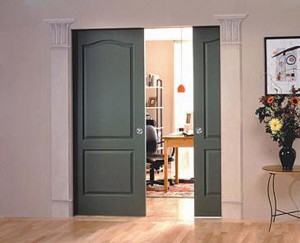 Why Do Pocket Doors Bind and Stick?
Why Do Pocket Doors Bind and Stick?
Pocket doors are convenient and save space, but over time they may become difficult to open and close. Among the most common repairs A-1 On Track encounters in homes are pocket doors that don’t operate properly.
So why do pocket doors bind and stick? There are several reasons:
- Structural settling in older homes. Door frames, wall studs and floors can bow with age, making it harder to move the pocket door.
- Tracks that become warped, displaced or bent. Settling or repeated use over time can damage a door’s track.
- Tracks that become clogged with hair, dust, plaster or other debris.
- Nails in the hollow wall opening into which the door recesses that either stop a door from sliding entirely or obstruct the smooth movement of the door. Nails that are hidden inside the door recess or painted over will leave deep scratches on the door.
- Moisture in basements or bathrooms sometimes warps pocket doors.
- Dirty, broken or missing rollers. Pocket doors don’t actually slide, they roll.
A close inspection with a flashlight will reveal why your pocket doors bind and stick. In many cases, slipping the door back into its track or adjusting the rollers with a screwdriver is all that is needed.
But in other instances, the help of an experienced sliding door contractor is necessary to repair the pocket door. Because they fit inside a hollow wall, working on pocket doors can be tricky. Removing the doors is sometimes the only option.
Hiring a contractor is a good idea when structural issues such as a bowed door frame are the problem. Rebuilding the frame may be a bigger job than you want to take on.
When doors warp due to moisture, eliminating the cause of the moisture or installing vents may also be necessary.
For expert pocket door repair, installation, or maintenance, call 408-866-0267 to schedule an appointment with A-1 On Track.
